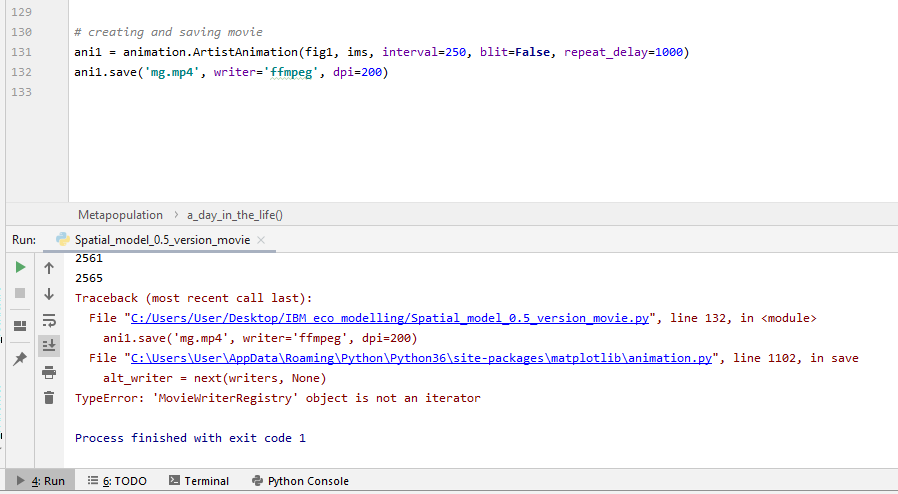I facing this problem after running the code and can’t view the model
its from the package matplotlib itself. what should I do. Thanks in advance
Hi, can you please post your code? At least the bit that’s throwing this error?
# -*- coding: utf-8 -*-
"""
Created on Wed Apr 16 08:39:37 2014
@author: Jboeye
"""
import random as rnd
import numpy as np
import math as math
import matplotlib.pyplot as plt
import matplotlib.animation as animation
class Individual:
'''Class that regulates individuals and their properties'''
def __init__(self,
x,
y,
resources):
'''Initialization'''
self.x = x
self.y = y
self.angle = rnd.uniform(0, 2 * math.pi)
self.resources = resources
self.age = 0
self.reproductive_age = rnd.randint(10, 15)
def move(self, max_x, max_y):
'''Calculates movement'''
speed = 1
diversion = math.pi / 3.0
self.resources -= 1
self.angle += rnd.uniform(-diversion, diversion)
dx = speed * math.cos(self.angle)
dy = speed * math.sin(self.angle)
self.x = (self.x + dx) % max_x
self.y = (self.y + dy) % max_y
class Metapopulation:
'''Contains the whole population, regulates daily affairs'''
def __init__(self,
max_x,
max_y):
'''Initialization'''
self.max_x = max_x
self.max_y = max_y
initial_resources = 70
self.environment = np.zeros((self.max_x, self.max_y)) + initial_resources
self.population = []
self.initialize_pop()
self.x = []
self.y1 = []
self.y2 = []
def initialize_pop(self):
'''Initialize individuals'''
startpop = 100
start_resources = 10
for n in range(startpop):
x = rnd.uniform(0, self.max_x)
y = rnd.uniform(0, self.max_y)
self.population.append(Individual(x, y,
start_resources))
def a_day_in_the_life(self, timer):
'''Replenish patches and draw visual'''
Dist_pop = np.zeros((self.max_x, self.max_y))
rnd.shuffle(self.population)
cost_of_offspring = 10
# shuffle population so that individuals in the beginning of the list
# don't get an advantage
oldpop = self.population[:]
del self.population[:]
for indiv in oldpop:
if indiv.age >= indiv.reproductive_age:
n_offspring = int(indiv.resources) // cost_of_offspring
for n in range(n_offspring):
self.population.append(Individual(indiv.x,
indiv.y,
cost_of_offspring))
Dist_pop[int(indiv.x), int(indiv.y)] += 1
else:
if indiv.resources >= 0:
indiv.move(self.max_x, self.max_y)
Dist_pop[int(indiv.x), int(indiv.y)] += 1
if self.environment[int(indiv.x), int(indiv.y)] > 0:
if self.environment[int(indiv.x), int(indiv.y)] > 5:
self.environment[int(indiv.x), int(indiv.y)] -= 5
indiv.resources += 5
else:
indiv.resources += self.environment[int(indiv.x), int(indiv.y)]
self.environment[int(indiv.x), int(indiv.y)] = 0
indiv.age += 1
self.population.append(indiv)
self.environment += 2 # replenish resources in patches
np.clip(self.environment, 0, 100, out=self.environment)
# amount of resources has to stay between 0 and 100
self.x.append(timer)
print(len(self.population))
self.y1.append(len(self.population))
self.y2.append(np.mean(self.environment))
# saving frames of movie
ima = ax1.imshow(Dist_pop, animated=True, cmap='Greens', interpolation='none', origin="upper")
imb = ax2.imshow(self.environment, animated=True, vmax=100, cmap='YlOrBr', interpolation='none', origin="upper")
imc, = ax3.plot(self.x, self.y1, 'b', animated=True)
imd, = ax4.plot(self.x, self.y2, 'r', animated=True)
ims.append([ima, imb, imc, imd])
meta = Metapopulation(40, 40)
# defining number of figures in movie
ims = []
fig1, ((ax1, ax2), (ax3, ax4)) = plt.subplots(2, 2, figsize=(7, 7))
ax1.set_title('Distribution of population')
ax2.set_title('Distribution of resource')
ax3.set_title('Population size')
ax4.set_title('Amount of resources')
for timer in range(400):
meta.a_day_in_the_life(timer)
# creating and saving movie
ani1 = animation.ArtistAnimation(fig1, ims, interval=250, blit=False, repeat_delay=1000)
ani1.save('mg.mp4', writer='ffmpeg', dpi=200)
That exception is a known bug falling back to Pillow for saving animations. You should be able to fix it by installing ffmpeg (since that’s what you’re specifying), or specifying a different writer.
i already installed ffmpeg
Can you check that ffmpeg is on the same path as your python - open a python terminal in the environment you’re programming in and try:
import os
os.which('ffmpeg')
and confirm that there’s an output.
